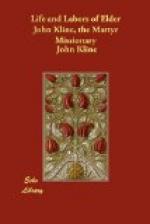“Esau found no place of repentance, though he sought it carefully with tears.” This means that all his sorrow or regret for the foolish bargain he had made would not and could not place him back where he was before. The blessing of his father had been given to another past all possibility of calling it back. I do not, and can not, however, as some do, apply this to the sin against the Holy Ghost. The blessing of Jacob was all external. It comprehended only earthly things. I will read it, so that you may hear it: “God give thee of the dew of heaven, and the fatness of the earth, and plenty of corn and wine: let people serve thee, and nations bow down to thee: be lord over thy brethren, and let thy mother’s sons bow down to thee: cursed be every one that curseth thee; and blessed be he that blesseth thee.” There is nothing in all this giving Jacob any claim to special favor from God, beyond that of mere earthly good. Neither does the sale of the birthright exclude Esau from any higher claim. He did not sell his right to serve the Lord, and thus inherit a heavenly blessing.
The people of God sometimes do things in the way of sin that cause them deep distress. At the same time they do not shut themselves irrevocably out of heaven, because repentance and reformation of life will reinstate them into the divine favor, and place them back into the good way again. But such may lose much, both in the church and the world by the misstep. After the sin of adultery, for example, has been fairly proved against a brother or sister, he can hardly reinstate himself fully into his former standing either in the church or in society at large. Thus is he like Esau. He has sold his birthright; yet still the Lord is ready, with outstretched arms, to receive him the moment he resolves to return, just as the loving father received his prodigal son. Thus it is with many other sins. They leave a sting in the heart which may rankle and fester a long time; and a stigma in the character which may never, in this world, be entirely wiped out.
In regard to the relation of Esau and Jacob, one more thought presses upon my mind, and I will give it utterance. In Jehovah’s prophecy to Rebekah before the birth of the children, these words from his own lips were spoken: “The elder shall serve the younger.” And in the prophecy of Malachi, the Lord Jehovah is represented by the prophet as saying: “I loved Jacob; I hated Esau.” Paul to the Romans quotes both these passages.
The Bible reader justly enquires: “Why this opposition to Esau and this favor to Jacob, when the children, as yet unborn, had done neither good nor evil?” Paul says it was: “That the purpose of God according to election might stand, not of works, but of him that calleth.” Brethren, I do sincerely believe that right here we find the key to many obscure passages in Paul’s writings on the subject of election and predestination. God can do nothing without means. Ends as surely imply means as effects imply causes. Esau and Jacob are the Lord’s chosen, elected, predestinated means of teaching his people a lesson of instruction that covers the whole ground of every Christian’s state and experience from the alpha to the omega.




